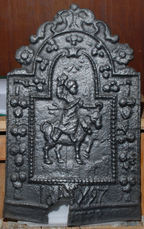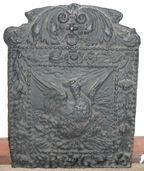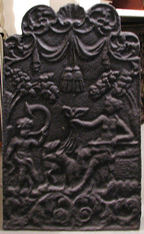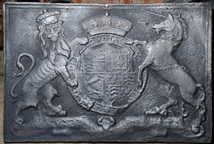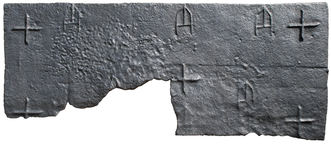-
212
Description: Arched rectangular central panel, bead edging, female figure, her right arm raised, sitting on a bull; arched rectangular border, fillet edging, swags of fruit bunches suspended from ribbon, inscription below central panel; on top, symmetrical floral swirls and flowers; plain panel at bottom.
Notes: The image is of Europa being carried away to Crete by Zeus disguised as a bull.
Copies of this fireback are known.
Inscription: 16 NDW 97
- Decoration tags:
- 'Dutch' (shape)
- fillet (edging)
- whole carved pattern
- pictorial
- mythological
- monogram
- text
- animals
- humans
Manufactured: in 1697 in the Siegerland area of Germany.
Current location: Brighton Museum and Art Gallery, Brighton, East Sussex, England.
Museum number: HA105015 (part of the Brighton Museum museum group)
- Attached to series:
- 'Dutch' NDW series
-
154
Description: Rectangular central panel with bead edging; a phoenix, with wings displayed, rising from the flames; rectangular border with bead edging, flowers and leaves festooned from a central flower; initials split either side of a flower at the base; on top, symmetrical swirled leaves.
Notes: Although similar to 'Dutch' types made in north Germany, this is probably an English design. A fireback bearing a phoenix was one of three designs ordered by Trubshaw's, ironmongers of London and Birmingham, from George Sitwell's furnace at Foxbrooke, Derbyshire, in the 1660s. Formerly part of the Ade Collection (from Grove Hill, Hellingly, Sussex).
Copies of this fireback are known.
Inscription: R (or B) G
- Decoration tags:
- 'Dutch' (shape)
- bead (edging)
- whole carved pattern
- individual letters
- mythological
- text
- animals
Manufactured: in the mid- to late-17th century in England.
Current location: Hastings Museum and Art Gallery, John's Place, Bohemia Road, Hastings, East Sussex, England.
Museum number: HASMG: 1952.51.16 (part of the Hastings Museum museum group)
Citation: Lloyd, N., 1925, 'Domestic Ironwork I', Architectural Review, 58, pp. 58-67.
Citation: Riden, P., 1985, George Sitwell's Letterbook, 1662-66 (Derbyshire Record Society vol. 10).
- Attached to series:
- British 'Dutch' style firebacks
- Phoenix firebacks
-
866
Description: Rectangular with a sinuous arch and three simulated loops, one top centre, the other two to each side; two-handled flower vase with gadrooned upper surface and acanthus bas-relief below, trailing fruited vines issuing from top descending through handles to base; lion’s mask at top; date split either side of vase base; ball on each shoulder of the plate; broadened side edges.
Notes: The simulated loops are seen on a small number of other firebacks, suggesting a common pattern-maker; a variation on a design typical of this period.
Inscription: 16 77
- Decoration tags:
- rectangular with ornate arch (shape)
- fillet (edging)
- whole carved pattern
- individual numbers
- extension panels
- pictorial
- text
- plants
- objects
Manufactured: in 1677 possibly in the Weald area of England.
Current location: Metropolitan Museum of Art, 1000, Fifth Avenue, New York, New York, United States of America.
Museum number: 08.81.1 (part of the Metropolitan Museum of Art, New York museum group)
- Attached to series:
- Gadrooned vase firebacks
- Loop edged firebacks
-
868
Description: Rectangular with arched, mirrored scrolls on top and central scallop shell, below which are swagged drapes with a central tassel; fillet edging; in a grove, to the left a putto blowing a horn, to the right a semi-naked female figure seated, holding the tail of a fish, with two ?dogs at her feet; at the bottom, narrow panel with symmetrical scrolled foliate decoration.
Notes: Like others in the series, the scene is not immediately identifiable with a scene in classical mythology.
Copies of this fireback are known.
- Decoration tags:
- rectangular with ornate arch (shape)
- fillet (edging)
- whole carved pattern
- pictorial
- mythological
- animals
- humans
- plants
Manufactured: in the early-18th century in England.
Current location: Metropolitan Museum of Art, 1000, Fifth Avenue, New York, New York, United States of America.
Museum number: 08.81.6 (part of the Metropolitan Museum of Art, New York museum group)
- Attached to series:
- Late pictorial series (all)
- Late pictorial series 2
-
304
Description: Rectangular; cavetto-moulded edging; English royal Stuart shield, garter, crown, supporters and motto.
Notes: One of many designs of the Stuart royal arms on firebacks. A recasting, hence the illegible motto. Sold at Christie's Masters and Makers auction, 30 November 2010, lot 517 (£1,875).
Copies of this fireback are known.
Inscription: HONI SOIT QVI MAL Y PENSE / DIEV ET MON DROIT
Arms: English Stuart royal
- Decoration tags:
- rectangular (shape)
- cavetto (edging)
- whole carved pattern
- armorial
- royal
- text
Manufactured: in the 17th century in England.
Current location: Suffolk House Antiques, High Street, Yoxford, Suffolk, England.
- Attached to series:
- Stuart royal armorial firebacks
-
636
Description: Rectangular; no edging; quasi-symmetrical arrangement of crosses and buckle outlines: a cross at each corner and one to right of middle, three buckles along the top and three buckles in triad, level with, and below, the central cross; two horizontal plank lines; lower left part of back missing due to wear and corrosion. The fireback has a small accumulation of iron slag on the reverse side, probably caused by a failure, by the founder, to tap off all the slag from the furnace hearth before casting.
Notes: The buckles, which could have been stamped using a branding iron, suggest a connection with the Pelham family. This is the fireback noted in 1861 at Warbleton Priory, Sussex, which the Pelhams endowed in 1413; the priory was dissolved in 1535 suggesting that the fireback dates from before then. The excrescence, left of centre, on the surface of the fireback was probably caused by molten iron being poured from a ladle into the sand mould and displacing some of the sand.
- Decoration tags:
- rectangular (shape)
- none (edging)
- simple stamps
- carved stamps
- planklines
- heraldic
- objects
Manufactured: in the early- to mid-16th century in the Weald area of England.
Current location: Anne of Cleves House, Southover High Street, Lewes, East Sussex, England.
(part of the Sussex Archaeological Society museum group)
- Attached to series:
- Pelham family firebacks
- Metalware stamp firebacks
